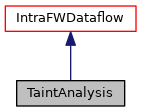Description
Definition at line 137 of file taintAnalysis.h.


Public Member Functions | |
| TaintAnalysis (LiveDeadVarsAnalysis *ldv_analysis) | |
| void | genInitState (const Function &func, const DataflowNode &node, const NodeState &state, std::vector< Lattice * > &initLattices, std::vector< NodeFact * > &initFacts) |
| Generate initial lattice state. | |
| bool | transfer (const Function &func, const DataflowNode &node_, NodeState &state, const std::vector< Lattice * > &dfInfo) |
| Adjust a result vertex pointer. | |
| std::ostream * | get_debug () const |
| Accessor for debug settings. | |
| void | set_debug (std::ostream *os) |
| Accessor for debug settings. | |
 Public Member Functions inherited from IntraFWDataflow Public Member Functions inherited from IntraFWDataflow | |
| NodeState * | initializeFunctionNodeState (const Function &func, NodeState *fState) |
| VirtualCFG::dataflow * | getInitialWorklist (const Function &func, bool firstVisit, bool analyzeDueToCallers, const set< Function > &calleesUpdated, NodeState *fState) |
| vector< Lattice * > | getLatticeAnte (NodeState *state) |
| vector< Lattice * > | getLatticePost (NodeState *state) |
| void | transferFunctionCall (const Function &func, const DataflowNode &n, NodeState *state) |
| vector< DataflowNode > | getDescendants (const DataflowNode &n) |
| DataflowNode | getUltimate (const Function &func) |
 Public Member Functions inherited from IntraUniDirectionalDataflow Public Member Functions inherited from IntraUniDirectionalDataflow | |
| bool | runAnalysis (const Function &func, NodeState *state, bool analyzeDueToCallers, std::set< Function > calleesUpdated) |
 Public Member Functions inherited from IntraUnitDataflow Public Member Functions inherited from IntraUnitDataflow | |
| virtual boost::shared_ptr< IntraDFTransferVisitor > | getTransferVisitor (const Function &func, const DataflowNode &n, NodeState &state, const std::vector< Lattice * > &dfInfo) |
 Public Member Functions inherited from IntraProceduralDataflow Public Member Functions inherited from IntraProceduralDataflow | |
| void | setInterAnalysis (InterProceduralDataflow *interDataflowAnalysis) |
| void | setInterAnalysis (IntraProceduralDataflow *intraDFAnalysis) |
| bool | runAnalysis (const Function &func, NodeState *state) |
| InterProceduralDataflow * | getInterAnalysis () const |
 Public Member Functions inherited from IntraProceduralAnalysis Public Member Functions inherited from IntraProceduralAnalysis | |
| void | setInterAnalysis (InterProceduralAnalysis *interAnalysis) |
 Public Member Functions inherited from Analysis Public Member Functions inherited from Analysis | |
| Analysis (bool(*f)(CFGNode)=defaultFilter) | |
Protected Member Functions | |
| bool | magic_tainted (SgNode *node, FiniteVarsExprsProductLattice *prodLat) |
| Make certain variables always tainted. | |
 Protected Member Functions inherited from IntraUniDirectionalDataflow Protected Member Functions inherited from IntraUniDirectionalDataflow | |
| bool | propagateStateToNextNode (const std::vector< Lattice * > &curNodeState, DataflowNode curDFNode, int nodeIndex, const std::vector< Lattice * > &nextNodeState, DataflowNode nextDFNode) |
| std::vector< DataflowNode > | gatherDescendants (std::vector< DataflowEdge > edges, DataflowNode(DataflowEdge::*edgeFn)() const) |
Static Protected Member Functions | |
| static std::string | lattice_info (const TaintLattice *lattice) |
| Helps print lattice pointers. | |
Protected Attributes | |
| LiveDeadVarsAnalysis * | ldv_analysis |
| std::ostream * | debug |
 Protected Attributes inherited from IntraProceduralAnalysis Protected Attributes inherited from IntraProceduralAnalysis | |
| InterProceduralAnalysis * | interAnalysis |
Additional Inherited Members | |
 Public Attributes inherited from IntraProceduralDataflow Public Attributes inherited from IntraProceduralDataflow | |
| std::set< Function > | visited |
 Public Attributes inherited from Analysis Public Attributes inherited from Analysis | |
| bool(* | filter )(CFGNode cfgn) |
Constructor & Destructor Documentation
◆ TaintAnalysis()
|
inline |
Definition at line 146 of file taintAnalysis.h.
Member Function Documentation
◆ get_debug()
|
inline |
Accessor for debug settings.
If a non-null output stream is supplied, then debugging information will be sent to that stream; otherwise debugging information is suppressed. Debugging is disabled by default.
Definition at line 152 of file taintAnalysis.h.
◆ set_debug()
|
inline |
Accessor for debug settings.
If a non-null output stream is supplied, then debugging information will be sent to that stream; otherwise debugging information is suppressed. Debugging is disabled by default.
Definition at line 153 of file taintAnalysis.h.
◆ genInitState()
|
virtual |
Generate initial lattice state.
Generates the initial lattice state for the given dataflow node, in the given function, with the given node state.
Implements IntraProceduralDataflow.
◆ transfer()
|
virtual |
Adjust a result vertex pointer.
This function has an opportunity to adjust the result lattice vertex pointer based on input lattice vertices at a particular AST node at a particular time in the data flow. For instance, if the AST node is an SgAddOp binry operation then we can obtain the vertices to which the two operands point (say, VERTEX_TAINTED and VERTEX_UNTAINTED) and adjust the result so it points to a particular vertex (say, VERTEX_TAINTED).
This method returns true if it changed where the result points, and false otherwise. For example, if the result originally pointed to VERTEX_BOTTOM but now points to VERTEX_TAINTED then we would return true.
Implements IntraUnitDataflow.
◆ lattice_info()
|
inlinestaticprotected |
Helps print lattice pointers.
Like std::cout <<"lhs lattice is " <<lattice_info(lhs) <<"\n". Convenient because the live/dead analysis causes some lattices to be missing (null).
Definition at line 192 of file taintAnalysis.h.
References TaintLattice::to_string().
◆ magic_tainted()
|
protected |
Make certain variables always tainted.
Variables whose names begin with the string "TAINTED" are assumed to be tainted regardless of their situation. This is our currently kludgy way of introducing taint into a specimen – the user modifies the specimen and introduces taint with these specially named variables. E.g.,
Member Data Documentation
◆ ldv_analysis
|
protected |
Definition at line 139 of file taintAnalysis.h.
◆ debug
|
protected |
Definition at line 140 of file taintAnalysis.h.
The documentation for this class was generated from the following file: